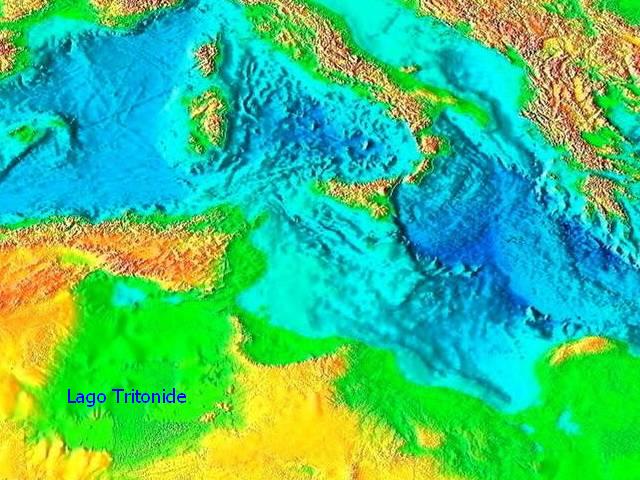Diodorus of Sicily (draft)
In Greek literature there are no references to Atlantis before Plato, with the exception of a quotation by Herodotus, which will be examined in the next section. After Plato, the authors who dealt with the matter basically reworked the philosopher text, rendering essentially superfluous to analyse their writings. All but one, a Sicilian fixed with universal history, who, in the first century BC, wrote the “Library of History” [1] in forty books (Diodorus of Sicily 1935).
According to Diodorus (this was the name of the Sicilian), many generations before the Trojan War, the Atlanteans, the most civilized people of their time, became subjected to the Libyan Amazons (Diodorus of Sicily 1935, Book III, 54, 1). In fact, long before the Amazons of the classical tradition (who lived along the river Thermodon, on the southern coast of the Black Sea), other Amazons had lived in Libya, originating from an island of the lake Tritonis [15] (Book III, 53, 4) from which they dominated the surrounding regions (Fig. 2). [16]
The Atlanteans surrendered en masse to the Amazon queen Myrina, when Cernê, the only city of theirs that had tried to resist, was completely destroyed (Book III, 54, 5). According to Diodorus, the Atlanteans, who owned many cities and lived in a fertile region on the edge of the sea (Book III, 56, 2), were a people extremely refined and pious, because the Gods had been born among them. Their first king had been Uranus, a God who had elevated them from the bestial state and had taught them agriculture (Book III, 56, 3).
Uranus had several wives, including Titea, who, before being called Gaea, gave him eighteen children: the Titans. One of these, Hyperion, succeeded his father and, at his death, the kingdom was divided between his brother Kronos and his nephew Atlas (son of another brother, Iapetus). Atlas took the coastal and the mountainous regions, giving its name not only to the mountains, but also to the inhabitants of the whole kingdom (Book III, 60, 1). According to the Cretans, Kronos reigned over Sicily, Libya and Italy (Book III, 60, 3).
In summary, this is what Diodorus said of Atlantis. Not a word about its conquest of Egypt or about the time and circumstances of the cataclysm that should have destroyed it.

Diodorus of Sicily.
And, obviously, with no political ambitions in mind, not a mention of the wonderful organization of its state. In short, although Diodorus almost certainly knew the Platonic Dialogues, it does not seem to have drawn from them. For him Atlantis was essentially the birthplace of the Gods and of the innovations they donated to men.
From the context it can be sensed that the Atlanteans conquered by the Amazons were the descendants of the ancient rulers of the world and that, although the reported wars were very ancient (many generations before the Trojan War), they were not primordial and certainly posterior to the cataclysm claimed by Plato.
If, as it seems, Dionysius Scytobrachion was Diodorus main source about Atlantis, it is indeed possible that in Egypt really circulated a legend about the western birth of the Gods and of the civilization, from which Dionysius could have drawn (living in Alexandria).
One thing, nonetheless, is quite clear from the account of Diodorus: the location of the Atlanteans: between the Atlas Mountains and the lake Tritonis, mostly concentrated in the then fertile Tunisian coast. In practice, the most favourable place to control Libya, Sicily and Italy, as claimed by both Diodorus and Plato.
Capitolo seguente

The lake Tritonis.
[1] The text of the third book of the Biblioteca Historica is available on:
http://penelope.uchicago.edu/Thayer/E/Roman/Texts/Diodorus_Siculus/3D*.html
[15] Identifiable with the vast Saharan depression south of the Atlas Mountains, which was actually a lake several thousand years ago.
[16] The source, quoted by Diodorus, is Dionysius, almost certainly Scytobrachion, a mythographer of Mytilene who lived and taught in Alexandria in the second century BC.